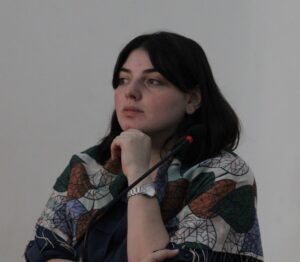- Thank you for accepting our invitation to serve as a keynote speaker at the Fourth International Conference – Terminology – Heritage and Modernity. Since this is your first time visiting Georgia, we’re interested to know what you know about our country.
This is indeed the first opportunity I have to visit Georgia and Tbilisi. I am afraid I know very little about Georgia, except perhaps historical facts that are already well-known. But I am intrigued by its unique geographical position, i.e. in Asia, but near Europe and near the Middle East, and how this can contribute to various cultural influences. As a Canadian, I am always intrigued by the different historical phases countries on this side of the world have gone through and how this can shape the identity of their people.
As someone how enjoys hiking, one of the things I looked into were the various trails one can hike in Georgia. I added a few days to my stay to be able to do one or two.
As a linguist, I also want to learn more about the Georgian language and its unique writing system.
- Could you please clarify the primary policy regarding terminology management coordination in Canada? Additionally, I’m curious about the specific organization responsible for establishing terminological standards, normalization procedures, and conducting terminological research within Canada.
Canada has a small population but a long and strong tradition in terminology. I can only give a few examples of the kind of terminology work in Canada in a short answer.
There are different language policies and Canada and this of course has an impact on the way terminology work is carried out. First the country as a whole has two official languages, i.e. English in French. However, some provinces and territories have their specific language policies: in New Brunswick, English and French are official; in Quebec, French has been the only official language since the middle of the 1970s; in the Northwestern territories and Nunavut, indigenous language (inuktitut and inuinnaqtun in Nunavut and 11 languages in the Northwestern territories) are official along with English and French[1].
There is an organization that is responsible for conducting terminology work at the Canadian level, i.e. the Translation Bureau. Terminology is a small part of its mandate to support the Canadian Government that must offer services in English and French, but also in indigenous languages and sign languages. The Bureau manages the Termium Plus® termbank, develops various terminological and linguistic resources, in addition to being active in terms of standardization activities. The Bureau collaborates with various national and international organizations that work on terminology and terminology standards.
Another important organization that is quite active in terminology is the Office québécois de la langue française (OQLF). The OQLF is responsible for applying the dispositions of the Quebec language policy and for ensuring that French is the language used at work, in communications, commerce, businesses and companies. The OQLF manages the Vitrine linguistique (a portal that allows users to look up the Grand dictionnaire terminologique, GDT, and the Vitrine linguistique). It also develops various terminological resources that are available in its website. One of the mandates of the OQLF is to contribute to the enrichment of the French language used in Quebec; it is thus quite active in the creation of neologisms. The OQLF produced guidelines such as the Politique de l’officialisation linguistique (Policy for linguistic officialization) that explains the different levels of intervention of the organization regarding terms.
[1] Compendium of language management in Canada (https://www.uottawa.ca/about-us/official-languages-bilingualism-institute/clmc).
 Linda Giorgadze
Linda Giorgadze
Research fellow at TSU Arnold Chikobava Institute of translating dictionaries and scientific terminology.








